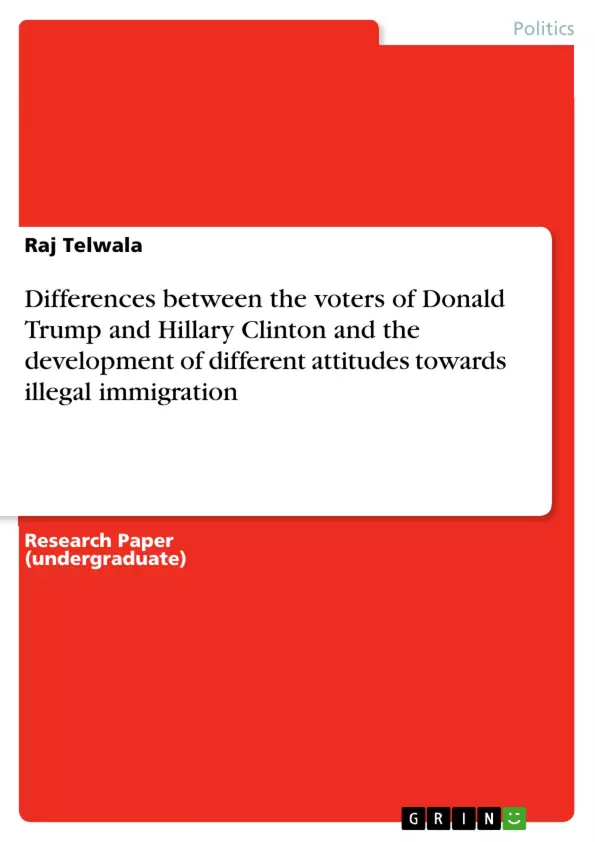This paper argues that Trump being an outsider resulted in a candidate that is not like what you would expect in normal candidates. The paper finds that Trump and Clinton both campaigned for policy but Trump’s approach will result in a difference in attitude development because Trump used the notions presented in social identity theory and predictive appeals while he campaigned for policy in regards to illegal immigration. Watching videos like the one on the Washington Post article, with the crowds chanting "Build the Wall" creates a phenomenon where Trump could be considered an unique candidate. The result of a candidate like Trump was that his voters attitude development was less influenced by political identity. In order to understand this phenomenon, the discussion of attitudes needs to take place.
Inhaltsverzeichnis (Table of Contents)
- Attitudes and Their Relation to Issue Voting
- Social Identity Theory
- Social Learning Theory
- Openness as a Personality Trait
- Demographics and its Relation to Issue Voting
- Race and Party Identification
- Ideological Labels and Self-Identification
- Microtargeting
Zielsetzung und Themenschwerpunkte (Objectives and Key Themes)
The primary objective of this paper is to examine how the outsider candidacy of Donald Trump influenced voter attitudes regarding illegal immigration during the 2016 Presidential election. The research explores whether Trump's unique approach, distinct from traditional political campaigns, led to a deviation from conventional attitude development models. The paper argues that Trump's campaign strategy, grounded in social identity theory and predictive appeals, significantly impacted voter attitudes.
- The impact of outsider candidacy on voter attitudes
- The role of social identity theory in shaping political attitudes
- The relationship between demographics and issue voting
- The influence of ideological labels and self-identification on voter behavior
- The significance of microtargeting and data analysis in political campaigns
Zusammenfassung der Kapitel (Chapter Summaries)
The paper begins by exploring the relationship between attitudes and issue voting, specifically regarding undocumented immigration. It highlights the significance of social identity theory in understanding how individuals develop political affiliations and attitudes. The discussion delves into the concept of “social learning theory” and its role in shaping individual attitudes through socialization. The paper then examines the importance of personality traits, particularly “openness,” in relation to social identity and the ability to embrace different groups.
Moving on to demographics, the paper examines the connection between racial groups, political parties, and voting patterns. It explores how race can be viewed as an identity influencing voter attitudes and behavior. The paper also discusses the influence of ideological labels and self-identification on issue voting, emphasizing how these factors shape voter choices.
Finally, the paper explores the growing role of microtargeting in political campaigns and how data analysis, particularly in states like Florida, can be used to accurately target specific demographics for electoral success. The paper concludes by highlighting the importance of understanding the interplay between social identity, demographics, and ideological labels in order to comprehend the complexities of voter attitudes and behavior.
Schlüsselwörter (Keywords)
The paper focuses on the interplay of social identity theory, demographics, and ideological labels in shaping voter attitudes and behavior regarding illegal immigration. It explores the impact of outsider candidacy, particularly Donald Trump's 2016 campaign strategy, on attitude development and its departure from traditional models. Key terms include: social identity theory, social learning theory, openness, demographics, race, ideological labels, microtargeting, and voter attitudes.
Frequently Asked Questions
How did Donald Trump's outsider status affect voter attitudes?
Trump's status as an outsider allowed him to use non-traditional campaign strategies, leading his voters' attitude development to be less influenced by conventional political identity.
What is the role of Social Identity Theory in the 2016 election?
The paper argues that Trump used notions of Social Identity Theory and predictive appeals to shape voter attitudes, particularly regarding illegal immigration and the "Build the Wall" phenomenon.
How does "Openness" as a personality trait relate to voting?
The research explores how openness influences an individual's social identity and their ability to embrace or reject different social groups, which in turn impacts issue voting.
What is microtargeting in political campaigns?
Microtargeting is the use of data analysis to target specific demographics with tailored messages. The paper discusses its significance in achieving electoral success, specifically in states like Florida.
Is there a link between race and party identification?
Yes, the paper examines how race acts as a central identity that significantly influences political affiliations and voter behavior regarding specific policy issues.
- Citation du texte
- Raj Telwala (Auteur), 2018, Differences between the voters of Donald Trump and Hillary Clinton and the development of different attitudes towards illegal immigration, Munich, GRIN Verlag, https://www.grin.com/document/412498



